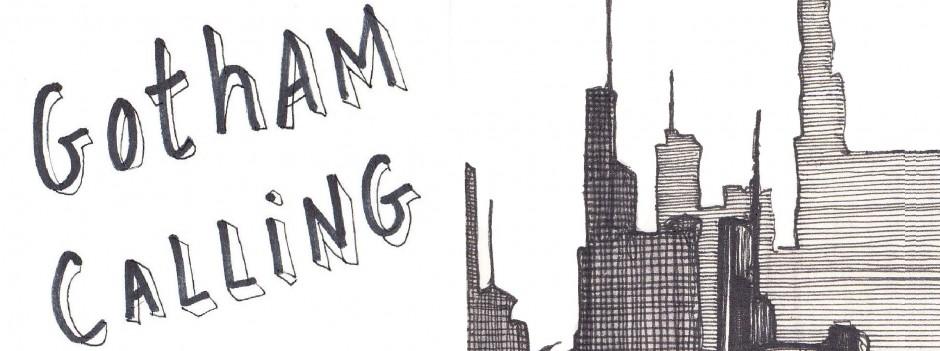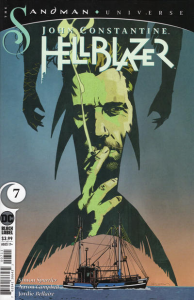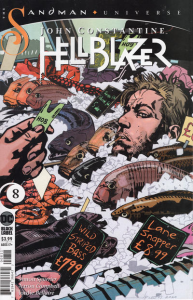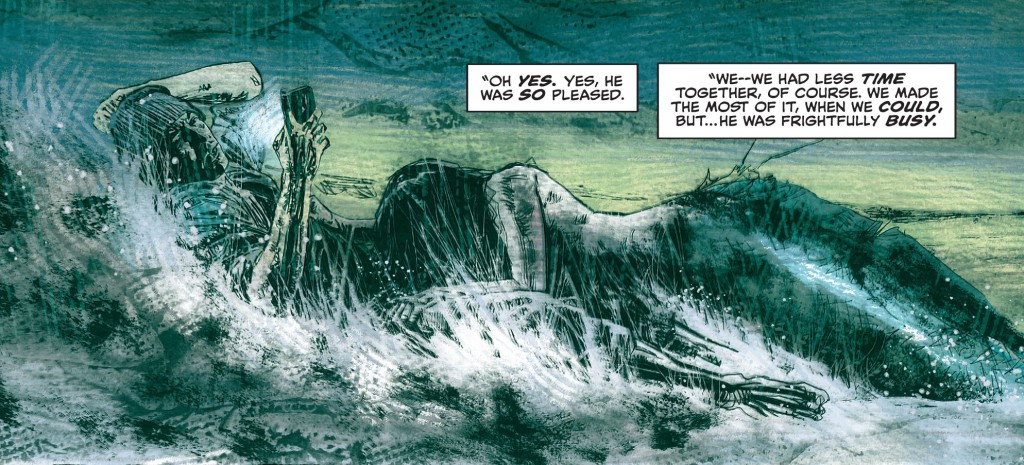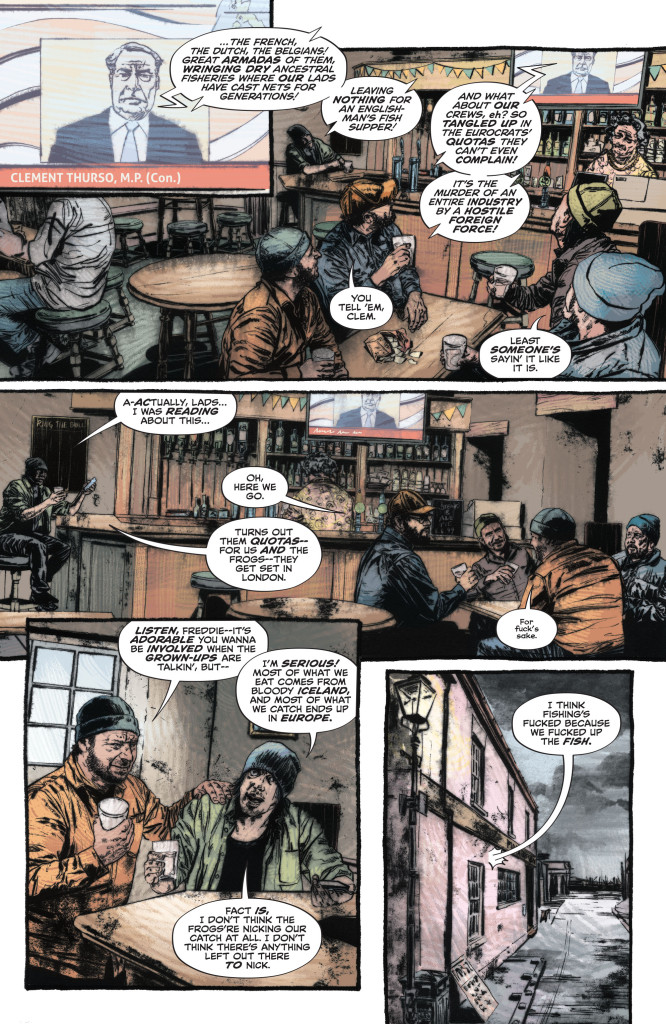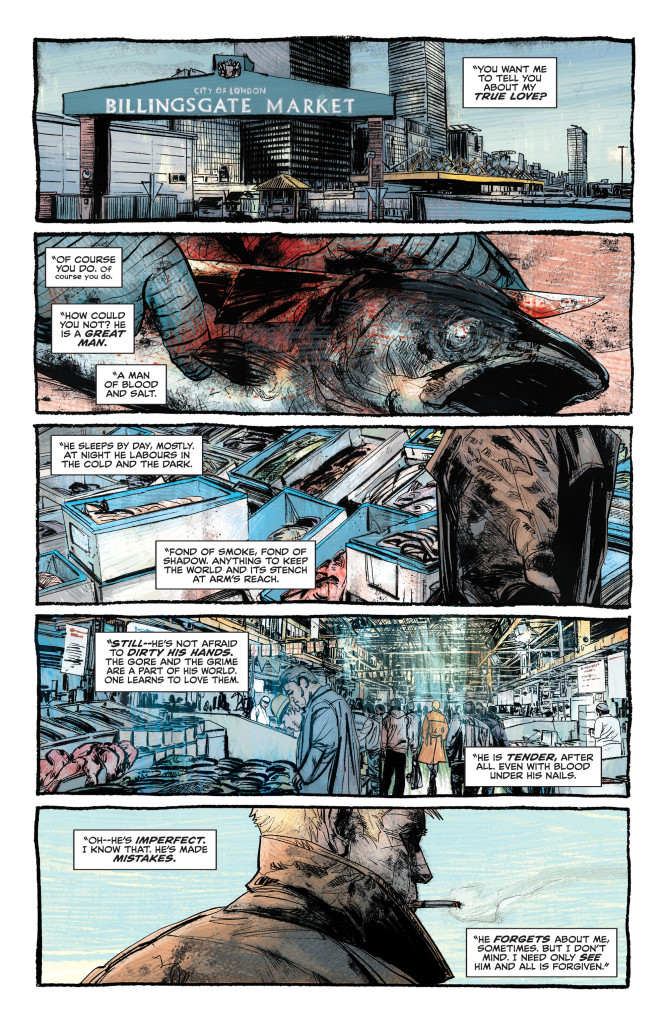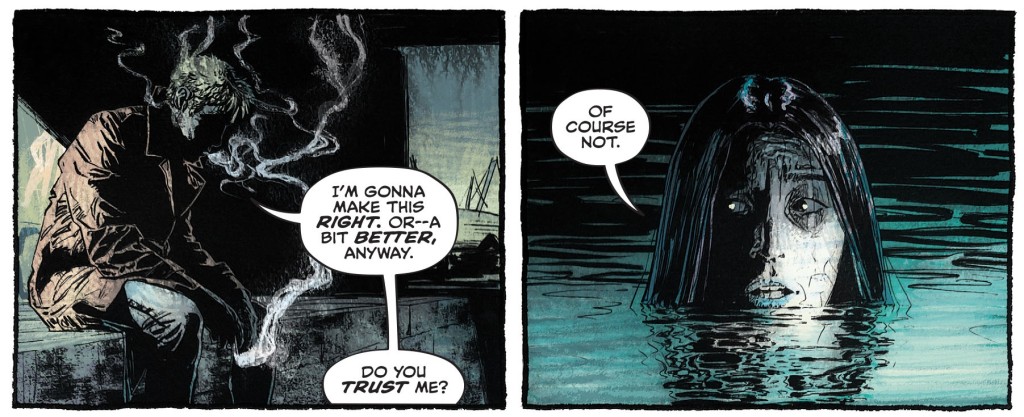Throughout 2020, two comic book series consistently had a blast translating Brexit-era chauvinism into supernatural horror. One of them was Kieron Gillen’s, Dan Mora’s, and Tamra Bonvillain’s Once & Future, in which the British past – even the imaginary version upon which nationalism is built – came across as gruesome and violent and certainly not something that anyone in their right mind should wish to reclaim (if there is any hope for the future, the series seems to suggest, it lies with people forging their identity out much more than what they inherited). The other one was Simon Spurrier’s run on John Constantine Hellblazer, the latest string of occult/satirical tales about the long-lasting cynical working class mage from Liverpool, whose two-parter ‘Britannia Rule the Waves’ (issues #7-8) is, if nothing else, the most brilliant horror story I’ve ever read about EU fishing quotas.
The latter series nailed Hellblazer’s trademark blend of dark fantasy and social commentary, mixing streets gangs with black magic, setting a ghost story around the NHS, and spinning a hilarious yarn around Prince Andrew’s scandalous links to Jeffrey Epstein. John Paul Leon’s covers and Aaron Campbell’s art, colored by Jordie Bellaire, were absolutely jaw-dropping (although I didn’t love the angular look of the fill-ins, by Matías Bergara). As usual, Spurrier’s ear for dialogue lent the text an almost musical quality, with a particular cadence based on accents and slang (‘There’s the troubled brow of a bloke wi’ his fair share of pissed-off exes, heh!’). He also displayed a pretty good grip on the titular anti-hero’s voice, solidly building on the characterization developed throughout the years (from John Constantine’s off-color humor to his bisexuality). On a more personal note, the fact that the first arc was set in Peckham Rye brought back fond memories, as I lived there ten years ago (and it was a much cooler place than what its crime-ridden reputation suggests).
Si Spurrier belongs to a crop of talented British comic book writers who have taken the industry by storm in the 21st century, along with the likes of Kieron Gillen and Al Ewing (not to mention Paul Cornell, who had been around for longer but only really stormed into Marvel in the 2000s). Jumping from the pages of 2000 AD, these creators have imbued American comics with a veritable burst of energy and intelligence. They also share an underlying concern with British cosmopolitanism, their comics often reacting – explicitly or implicitly – against the rise of open racism in the UK. Indeed, the connecting arc of Spurrier’s Hellblazer revolves around Constantine’s investigation into various monstrous creatures conjured by national pride… which brings us to ‘Britannia Rule the Waves,’ where an Essex fisherman (who is also a fishmonger, for narrative convenience) has a lurid affair with a mermaid that helps him fight off French fishing boats in order safeguard his trade.
As you can tell from the image above, the artwork is stunning… Aaron Campbell’s light yet dirty draftsmanship and, particularly, Jordie Bellaire’s enveloping colors establish the required combination of realism and nightmarish eeriness. The smell of fish and maritime winds practically oozes from the pages. The goriest panels are typically covered with an aggressive red (which provides a symbolic link to the ‘salmon run’ comparison Constantine brings up in the final stretch), although the most shocking moment is actually rendered through a blue-tinged splash, creating a suitably nauseating visual. In the Hellblazer canon, the result sometimes verges on the realism of a Leonardo Manco or a Tim Bradstreet, but it also feels unique – the art is likely to stand out in one’s memory, like that in other remarkable issues of the series (such as those by the recently departed Richard Corben). Letterer Aditya Bidikar contributes to the unsettling tone as well, as the words become visibly hesitant and uneasy at key points in the comic, often changing size or intensity to convey the odd whispered aside (usually ‘Fuckwitt’).
Like I mentioned above, Hellblazer has always committedly fit into a tradition of socially conscious horror that stretches from cult classics like Wolfen to the wave of post-Get Out attempts to capture the paranoia-inducing conditions of African-American existence (whether it’s Lovecraft Country‘s all-out fantasy or Blindspotting‘s low-key, thriller-like tension). Thematically, the background of ‘Britannia Rule the Waves’ (whose title is an obvious reference to the patriotic song ‘Rule, Britannia!’) is the resentment in the UK over other nations’ access to British territorial waters, enabled by the European Union (which was a major sticking point in the Brexit negotiations taking place at the time these comics came out). In other words, like the real-world debate about fishing rights, the story is about much more than the regulation of access to fish, touching upon the twin nerve of nationalism and xenophobia – plus the overlapping issue of environmental devastation – as succinctly illustrated in this scene:
Let’s get the spoilers out of the way. The first twist in the story is that the mermaid is deeply in love with Freddie, the fisherman who conjured her (using a spell provided by a mysterious old man). Their relationship, besides being highly sexual, turns out to be extremely abusive as well, as he’s basically just using her to get fish and respect from his manly peers (while getting off with other women on the side). The second big twist is that the mermaid gets pregnant and Freddie, lovely chap that he is, pushes her away – he only takes her back once he realizes she has amazing self-healing powers, which means that he can keep chopping off her tail and selling it as monkfish. Feel free to read in this a sick parable about Britain ruthlessly and recklessly exploiting its resources while blaming foreigners when things turn bad.
This is one of those comics in which John Constantine remains mostly passive, serving as a bastard version of the Phantom Stranger: part witness to the horror, part dispenser of EC-style ironic justice. Just like Brian Azzarello once had John unleash a Jewish golem against neo-Nazis, Si Spurrier has him push Freddie into the waters where the fisherman gets devoured by fish – more precisely, by his own children! (As for the creepy old man who provided the spell, although you don’t really need to know this to appreciate the tale, his actions tie into the series’ overarching saga, so this two-parter helps set up his plan, revealed in later issues.)
I guess you can see in the story echoes of a certain kind of post-referendum discourse against working class voters who chose to leave the EU (the British equivalent of Hilary Clinton’s ‘basket of deplorables’), with the fishing community coming across as somewhat despicable. Yet there is also a degree of empathy with the plight of these men, acknowledging their economic despair and (misdirected) fear. I especially like the passage in which Constantine describes how, every day at 4am, Freddie waits for the market to open while ‘sucking smokes like a brat with a milkshake.’ Ultimately, the fishermen are just trying to get by, responding to pressures of demand by ‘all them chefs and foodies watchin’ the haul of fuglyfish get smaller and smaller…’
In short, ‘Britannia Rule the Waves’ powerfully draws horror from a combination of surreal imagery and real social issues (right-wing populism, economic hardship, ecological crisis, toxic masculinity…), treading the line between politically informed dark comedy and chilling, emotional drama. This balancing act, coupled with the acerbic, non-linear storytelling, makes this Hellblazer at its finest: the comic is a worthy successor to vintage tales such as ‘When Johnny Comes Marching Home,’ ‘Early Warning/How I Learned to Love the Bomb,’ ‘Hold Me,’ ‘Fear and Loathing,’ ‘Setting Sun,’ and ‘Scab,’ among many others. (And yes, the second story in the ‘Setting Sun’ issue, in which John recalls his previous lovers, has now become a bit of an awkward read, given the recent revelations about Warren Ellis’ manipulative promiscuity…)
Like those classics, this one is also beautifully written, with the prose interweaving the various layers at play. Check out how the very first page, below, has a lyrical description of the (not usually romanticized) figure of a fishmonger that also doubles as a metaphorical allusion to John Constantine himself:
The reason I didn’t include the paperback collecting the first half of Spurrier’s 12-part run, Marks of Woe, in my list of top 2020 books is because this trade opens with a couple of issues (The Sandman Universe Presents: Hellblazer and Books of Magic #14) that are all about continuity-fixing, tying up loose ends from three decades ago and joining the dots between various bits from the long history of both Hellblazer and Books of Magic (going back to the original Neil Gaiman mini-series). I wanted to keep the recommendations relatively accessible and those opening chapters seemed impenetrable for anyone without a Vertigo degree – in fact, for anyone without a DC PhD, since they even featured references to Doomsday Clock, the infamous crossover between Watchmen and the latest reboots of the DCU (‘The New 52’ and ‘DC Rebirth’). Most readers could perhaps get the gist of things, but they wouldn’t have much reason to care… Seriously, Hellblazer is up there with Batman as my favorite comic book franchise and even I couldn’t bring myself to care all that much.
While I’m onboard for having John Constantine occasionally pop up in other DC titles, I don’t think his own series has much to gain from being treated as a superhero-like, exposition-heavy kaleidoscope of a thousand different publications you have to check in order to properly follow the main story. A special one-shot could certainly be the place for it, but the problem is that the rest of Si Spurrier’s run was intrinsically related to a plot point from these issues (in which Constantine once again sold his soul for a return to health), so they contaminated much of what followed, clever as it was. Fortunately, you don’t really need all that background to enjoy ‘Britannia Rule the Waves’ (which should be collected next month, in the book The Best Version of You).
In any case, like I mentioned above, there was still quite a lot to like in Si Spurrier’s John Constantine Hellblazer. In fact, it’s a damn shame this series has been canceled (even if it was allowed to wrap up its main plot in a double-sized final issue). The age of Brexit and Covid-19 is ripe for exploitation by what has often been one of the most twisted and viciously entertaining comics in the field…
